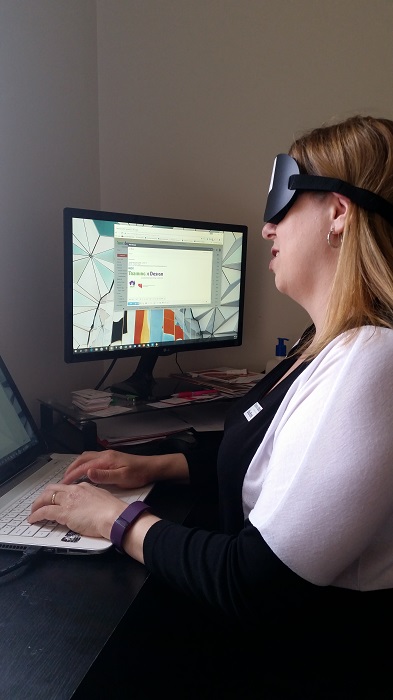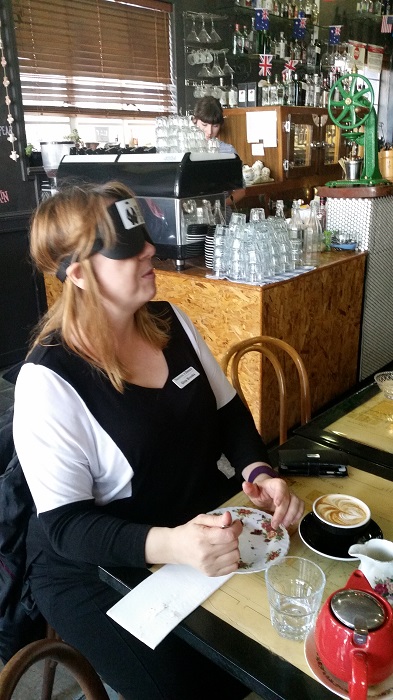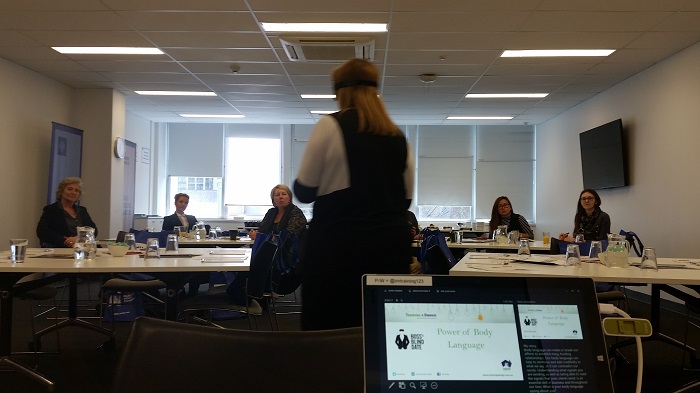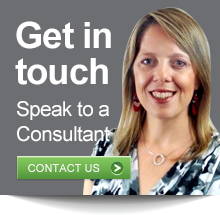On Monday 10 October 2016 our Director, Gina Brooks, worked a whole day blind. She did it to raise money for Guide Dogs SA/NT, and in the process learned a lot about herself. Read on to find out what that was.
Gina’s guide was one of her vendors, Leticia Mooney at Brutal Pixie, who donated a full day and $300 to the cause, to help Gina get around. The pair spent two hours in training at Guide Dogs SA/NT to learn how to be guided, and how to guide. While wearing a blindfold doesn’t sound like a big deal, the blindfolds exclude even the tiniest bit of light. Gina was truly in complete darkness while wearing it.
Here is Gina’s reflection on the day.
Preparing for the Boss’s Blind Date day was relatively easy
I felt fortunate that my workday was starting at 9.00. I still had the benefit of my sight, which helped me  get ready in the morning. But I started to wonder: How would I do it if I was blind? How would my hair look? How would I coordinate outfits? I would probably be like superman and wear the same outfit everyday so that I didn’t need to make that decision.
The need to find things would change how I arranged my life, too, I considered. I would need to have all my things in the same places all the time, so I would know where everything is. No more leaving stuff in different places! If something wasn’t in the same place, then I wouldn’t find it. Regular, unremarkable things like cereal or bread, finding the milk, and other foods and condiments.
Before Leticia, my human guide, came over, my 12-year old daughter Siena was helping me practice for  my “lunch and learn” body language workshop. She helped me make sure that I had the right slide up at the right time, and remembered my session plan.
Siena thought it was hilarious how I would sometimes get it mixed up. But she didn’t think it was so funny when she tried to trick me into bumping into her. She got an accidental whack across the chest as I gestured expansively, and couldn’t see where she was.
The day began at 9 am, with my human guide
When Leticia arrived at my office at about 9 am, she helped me start the day. There were a few emails that I had to send, but not many. I made sure I an autoresponse on my email so that people wouldn’t expect a written reply from me during the day.

But even with Leticia’s help, I found the process lengthy and cumbersome. I’m a pretty impatient person. If I were ever left without my sight, I doubt I would email so much. I think I’d spend most of my time calling people instead.
Having said that, if I had the specialised software installed on my computer for vision impaired people it might be easier.
Leticia pointed out that the F key and the J key on a computer keyboard both have a raised bump, so you know where they are. I’d never noticed before! Given I’m a pretty good touch-typer, this tip was essential to me when writing emails.
Getting into the city taught me that I need to know everything
Then we planned our day, and set off. Leticia drove my car. I had packed my Trainer’s Case the night before so I had all my equipment, paperwork and pens. I didn’t have to worry about gathering my things. There is no way I would have been able to find what I needed otherwise: I don’t allocate specific places for each thing. As a very visual person, I rely heavily on my sight even when I pack my case every day.
I discovered that I need to know about everything, all the time!
Driving into the city, I found myself asking Leticia where we were while in the car. Already I had discovered something about myself: That I ‘need to know’ about everything all the time!
The other thing I did a lot was ask for the time. The second thing I learned about myself was that I am very focused on how much time I have to do whatever I’m doing. I learned that I micro-manage my time, and that I look at the time more often than I thought I did.
This could be because I pack in a lot in a day, and like to keep on top of things. I discovered that I’m very time-driven in general, and it made me uncomfortable not knowing the time, and potentially not keeping to time. I also started to feel like I wasted a lot of time as I was so dependent on Leticia to do anything.
This was the case even though we kept perfectly to time all day, and we achieved everything we set out to achieve. Being sightless forces me to look inwards and face a lot of those discomforts.
Suddenly I was really aware of my surroundings
After parking the car, I needed to venture out onto narrow footpaths, with uneven ground. My ankles getting a good workout just trying to keep me upright! Not being able to see who was walking around me was also quite unsettling. I’m used to bumping into people that I know walking down Waymouth Street, and I didn’t like not being able to know who was around.
I started to ask Leticia to explain to me whether people were around. Bumping into people on the footpath was unsettling and even frightening. I didn’t know, for example, that the corner of a pram wasn’t something much larger, or that I wouldn’t run into it face-first.

Familiar surroundings were comforting
Going into George’s for coffee was fun. It’s a familiar venue, so I had a feeling for where the bar was, and also correctly guessed at which table we were seated. Here I felt comfortable and safe. The coffee was familiar and the staff member, Erica, was familiar as well.
I trusted the staff and I trusted this venue. Though, I did wonder: How I could be assured that the paywave machine had the correct amount on it so I wasn’t being skimmed?
Trust is a crucial thing for the vision impaired
When I went to pay electronically, I realised that trusting people is crucial for a vision impaired person. They need to be able to trust others to help and not hinder, to assist and not exploit their disability. I can imagine that, just like wearing a consistent outfit, I would also have consistent cafes, restaurants & shops. It was important to me that I went to a farmiliar place so that I could feel comfortable & safe.
As Leticia and I walked over to the Australian Institute of Management on Currie Street, which was where I was delivering the seminar, I noticed how sensitive I was becoming to my surroundings. I knew that we were walking through the Topham Mall Arcade when I felt a stronger breeze. I knew that I was out in the open because it was slightly warmer, as opposed to being undercover.
Off to AIM, and to deliver a body language workshop without my sight
We made it to the AIM building successfully, but the lift wasn’t working. It was damaged during the blackout that hit South Australia earlier this month. I had never used the stairs in this building, and now I had to climb two flights of stairs.
Navigating those stairs wasn’t difficult, I didn’t think. Although Leticia seemed to be much more concerned than I was that I was going too fast. I think she was terrified I was going to trip and face-plant into the stairwell.
Once in the AIM offices I immediately felt safe & comfortable,as I’m very familiar with the environment. Leticia and Debbie from AIM set up the training room, and I practiced getting oriented within the presentation space. Leticia had placed the whiteboard, desk & banner so that it formed a boundary behind me and the tables formed the boundary in front of me. This meant that I could move freely within the space. Every so often I had to re-orient myself to ensure I was facing the right way.
I felt safe presenting the workshop. I knew who was attending and that I was amongst supporters. I knew that they would laugh with me if i messed something up or bumped into the furniture or was facing the wrong way. I presented the session with my usual confidence and humour ensuring lots of interaction with my learners. To their credit, the participants quickly adapted to giving verbal feedback – ‘uh huh’, ‘yeah’, ‘mm’ – instead of smiling and nodding.

Not being able to see the participants body language was difficult as a trainer. I had to rely on verbal nodding and Q & A to keep people engaged and to check their understanding. I didn’t know if people were bored or “with me”, so I needed to keep asking for confirmation before moving on.
Although we did have some moments. Being so dependent on my guide meant that when Leticia said ‘you could just sit on the table’, I “blindly” followed her instruction… only to find that the table was on wheels and unsecured. I had to very quickly gather my feet when it tried to get away from me! Oops!
Activities in the workshop
During the body language workshop I asked participants to get a feel of what it would be like without the benefit of seeing “body language” to communicate a simple message.
Activity 1: Introductions without sight
I asked participants to get into pairs “back-to-back”, and asked them to tell each other their name and where they worked, taking only one minute.
During the debrief it was clear that, without the benefit of seeing the other person’s body language, they could only gather the content of what the message was rather than the context. The context helped them to understand how they felt about their work. They had to be more descriptive to send the message.
We also discussed how when we send emails or other forms of written communication we need to be aware of context to make sure that we send the right message.
Activity 2: Discuss without sight
Next, I asked the participants to partner up with the same person (again back to back) and talk about their weekend. But this time they had to close their eyes. They had only one minute.
Most people agreed that it seemed easier to listen and focus on what the other person was saying because there were fewer distractions. Most interesting was the response, ‘Yes it was easier to listen, but it was harder to talk’.
It’s harder to talk when you’re blind
This profound statement reflects my personal experience.
I talk for a living. I am constantly presenting or speaking to groups or one-on-one with clients. And if you know me, then you know that I am never short for words — except when I have that blindfold on!
The isolating effect it has on my ability to contribute is huge. Absolutely nothing came to mind: No conversation starters, no tidbits to share, no stories or ‘did you know’. I felt like I had lost my ability to participate in the world, and could only offer short answers to any questions.
It was almost like it felt too hard.
It’s difficult to be a confident contributor when you’re blind
It got me thinking how difficult it would be to be confident in your contribution, and willing to participate proactively in your environment, without your sight.
My blindness experience taught me a lot about human interaction
I recalled feeling ‘unsafe’ when others were in the carpark lift and didn’t acknowledge me. I remembered how I instantly smiled and said hello when someone walking past read my ‘boss’s blind date’ sign out loud, and that I did it just to feel noticed. I recalled how unsettling it was when others walked by, slowed down to read my sign, and kept walking without saying anything.
I really wanted to be acknowledged by people coming past. I wanted them just to say hi, to know that they saw me, because I couldn’t see them. I recalled how i couldn’t help but think people were laughing at me in the coffee shop.
I realised just how much we rely on our sight to make meaningful human connections and acknowledge that someone else exists.
Now I will always say hi when i’m in a lift or in close proximity to a vision impaired person. The experience has taught me to be proactive: To ask them how their day is, how was work, and how’s the weekend. It’s so easy to be left out of a conversation when you’re in a group of people, even if you’re supposed to be the reason why everyone is there!
Things I learned from Boss’s Blind Date 2016
I learned that brushing past people who can’t see you is extremely unnerving for them. It makes you feel vulnerable to the actions of someone else, regardless of how good is their intention.
I learned that you should never sit a blind person near the door or a busy walkway, as they can feel every person that walks past. Not knowing who came in and who walked past can feel unsettling, especially when it’s continuous.
I learned how routine and consistency is everything: Familiar clothes, routine, workplace and venues really helped me feel ‘safe’.
I learned how important it is to have trust in the people around you. Surrounding yourself with support is important because you depend on them so much.
I learned how to be mindful of the world around me
In our fast-paced world, it is important to slow down and notice your surroundings. When I was ‘blind’, I unexpectedly experienced that it was much easier to be ‘in the moment’. Being mindful can be a struggle for some people, and especially for me: Not thinking of the past or the future and quietening your mind can be really hard. I found that without my sight, it was easier to reset my mind and clear my head, and just focus on what I was doing at that moment.
Thank you to everyone who supported me!
I feel blessed to have such a supportive network who not only donated to this cause but also went out of their way to contribute. Thanks to all of you for your messages of encouragement and your ongoing enquiries to how I was going.
Special thanks
Debbie at AIM, who said “absolutely” when I asked them if they wanted to be involved in hosting a workshop, was fantastic. They not only provided the venue but they threw in a free lunch.
Thank you to Guide Dogs SA/NT who asked me to participate in this challenge. I rarely back away from a challenge when asked, and I really value the work that Guide Dogs do. They don’t just support vision impaired people and families living with autism, but they put genuine effort into ensuring these people experience a good quality of life.
But i’m most grateful for Leticia from Brutal Pixie, who was my human guide. She patiently attended to my every need, and kept me safe (and productive!) during my work day. How fortunate I was that she agreed to be my guide! I trusted her completely. Knowing her analytical nature and ability to pay attention and focus was why I asked her in the first place, and I’m soooooo glad she said yes.
Should you do the Boss’s Blind Date Challenge?
Yes! I highly recommend this challenge to anyone. It will teach you more about yourself and how you approach your world. And it will also challenge your thinking, allow you to experience life in a new and different way. And, of course, it will raise needed funds for a very worthy cause.
You can still donate
Now that you’ve gotten this far, please click here and donate. Every little bit helps! We are still working to raise $8000 for Guide Dogs SA/NT, and your contribution will take us just that little bit further.



Hi Gina, Exceptional effort, you are an inspiration to us all. you did it for a day, imagine living that way every day, congratulations. Vito
Thanks so much for your support Vito – muchly appreciated
Great effort, Gina! I’ll share a story with you next time regarding Sydney’s peak hour, crowded trains and how a young man navigated his way around with no guide: very, very inspirational to myself and others that afternoon. To him: just business as usual.